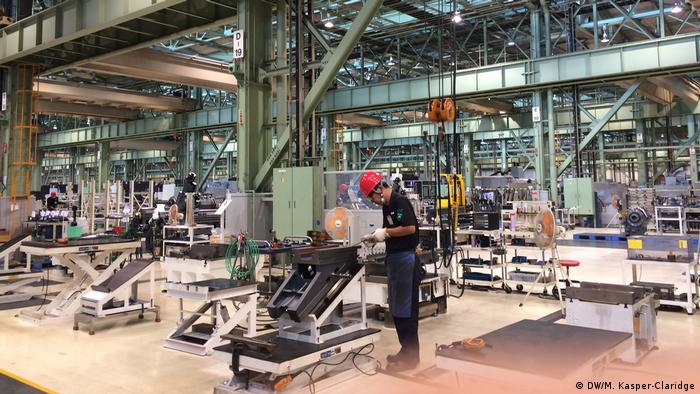Japanese and German cooperation on Industry 4.0
Oct 20, 2016
A machine-tool maker called DMG Mori has its headquarters in Iga. What's special about the company is that it's working on the next generation of industrial machines - the 'Industry 4.0' generation.

The Japanese town of Iga is postcard-pretty. The houses here in Mie Prefecture are graced by the flowing curves of traditional Japanese rooftops, and they sit calmly at the base of high hills clothed in majestic pine-woods. Traditional as Iga's neighborhoods may appear, however, there's something rather revolutionary brewing in this countryside idyll an hour and a half by automobile southwest of the city of Nagoya.
Automated decisions made by machines
DMG Mori's big research and development center in Iga is staffed by young engineers who were trained at Japan's elite universities. They design machines which communicate with one another and make decisions autonomously, guided by software and data rather than human machine-tool operators. Those designs are never final - the engineers continuously work on improving them.
The current state-of-the-art machines can be viewed in operation at the company's huge 3,500-square-meter exhibition room, a shiny, spotless place. There, nimble robot arms take parts and place them very precisely and quickly into position in tool-making machines, where they're processed.
A marriage of equals
"Business is going well," according to Takashi Okuda, head of project management at DMG Mori. "Our clients want more automation and more efficient capacity utilization of the machines - around the world."
Soon, for example, DMG Mori's Japanese machines are expected to be able to communicate with Russian machine-tools, and delegate work to the latter at times when they're sitting idle. That's not just an engineer's distant dream - it's an emerging reality.
The potential efficiencies associated with enabling global networking of machine-tools are in demand, and that's presumably why Masahiko Mori, president of Mori Seiki, increased his ownership of the German machine-tool maker DMG Mori to 75 percent early in 2016.
DMG Mori used to be called Gildemeister, and were among the best-known German machine-tool makers. Gildemeister was headquartered in the western German town of Bielefeld. Now, German engineers and managers regularly make the pilgrimage to Iga in Japan, their company's new headquarters location.
Japanese engineers, in turn, are frequent visitors at the company's facilities in Bielefeld. The fusion of Mori and Gildemeister is meant to be a marriage of equals, even if the majority shareholder, the man who calls the company's shots, is Japanese.
Globalization of Japan's economy
Masahiko Mori, a fit man in his mid-fifties, has a passion for high-tech machines, and the sort of mind that cares about every detail. In the time leading up to his investment in Gildemeister, it became clear to him that his company needed to go international.
"If we were a normal Japanese company, we could not survive," he told DW.
Marcus Schürmann, CEO of the German Chamber of Industry and Commerce in Japan, said that "Japanese industry is globalizing" - the larger companies amongst Japan's mid-size enterprises, as well as its established multinational corporations, are investing massively in emerging markets, especially in southeast Asia.
This will bring opportunities for German companies too, Schürmann said, because the times when Japanese companies purchased parts exclusively from Japanese suppliers were over - for good. That has made Japan a more interesting place for German companies to do business.
Suddenly, they're working together
"Japan in some sectors makes more foreign direct investments than does China or Korea," Schürmann said from his perch in a glass-fronted Tokyo skyscraper. Schürmann, who has lived in Japan since 1989, sees big opportunities associated with Industry 4.0, with its new generation of smart factories in which production systems and machines are networked and run by software.
This year in April, German and Japanese officials agreed on a Memorandum of Understanding at ministerial level which envisioned technical collaboration in many key aspects of Industry 4.0. The long-standing competition between German and Japanese machine-tool makers is meant to be softened by cooperation, at least to some degree.
Man or machine?
In Japan's Iga province, the future is already here. In a DMG Mori factory hall, huge screens show which of the company's production machines - whether they're in Germany or Japan - are currently being underutilized and therefore available for more throughput. Technicians quietly guide the machines through their production steps - though the men are scarcely needed anymore, because the machines do nearly everything on their own.
But not quite everything. In a corner of the building, skillful men finish complex machined parts with hand-held metal-files. Even for this very specialized task, it would be possible to replace men with machines, a DMG Mori engineer explains - but the file-wielding men produce better results.
For now, at any rate.
Source: Deutsche Welle